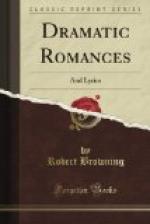He was leagues in the desert already
Driving the flocks up the mountain
Or catlike couched hard by the fountain 70
To waylay the date-gathering negress:
So guarded he entrance or egress.
“How he stands!” quoth the King: “we may well swear,
(No novice, we’ve won our spurs elsewhere
And so can afford the confession)
We exercise wholesome discretion
In keeping aloof from his threshold;
Once hold you, those jaws want no fresh hold,
Their first would too pleasantly purloin
The visitor’s brisket or surloin: 80
But who’s he would prove so fool-hardy?
Not the best man of Marignan, pardie!”
The sentence no sooner was uttered,
Than over the rails a glove fluttered,
Fell close to the lion, and rested:
The dame ’twas, who flung it and jested
With life so, De Lorge had been wooing
For months past; he sat there pursuing
His suit, weighing out with nonchalance
Fine speeches like gold from a balance.
90
Sound the trumpet, no true knight’s a tarrier!
De Lorge made one leap at the barrier,
Walked straight to the glove—while the
lion
Ne’er moved, kept his far-reaching eye on
The palm-tree-edged desert-spring’s sapphire,
And the musky oiled skin of the Kaffir—
Picked it up, and as calmly retreated,
Leaped back where the lady was seated,
And full in the face of its owner
Flung the glove.
“Your heart’s queen, you dethrone her?
100
So should I!”—cried the King—“’twas
mere vanity
Not love set that task to humanity!”
Lords and ladies alike turned with loathing
>From such a proved wolf in sheep’s clothing.
Not so, I; for I caught an expression
In her brow’s undisturbed self-possession
Amid the Court’s scoffing and merriment,
As if from no pleasing experiment
She rose, yet of pain not much heedful
So long as the process was needful,—
110
As if she had tried in a crucible,
To what “speeches like gold” were reducible,
And, finding the finest prove copper,
Felt the smoke in her face was but proper;
To know what she had not to trust to,
Was worth all the ashes and dust too.
She went out ’mid hooting and laughter;
Clement Marot stayed; I followed after,
And asked, as a grace, what it all meant?
If she wished not the rash deed’s recalment?
120
For I”—so I spoke—“am
a poet:
Human nature,—behoves that I know it!”
She told me, “Too long had I heard
Of the deed proved alone by the word:
For my love—what De Lorge would not dare!
With my scorn—what De Lorge could compare!
And the endless descriptions of death
He would brave when my lip formed a breath,
I must reckon as braved, or, of course,
Doubt his word—and moreover, perforce,




